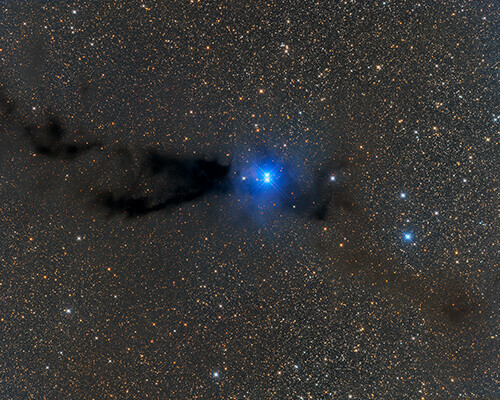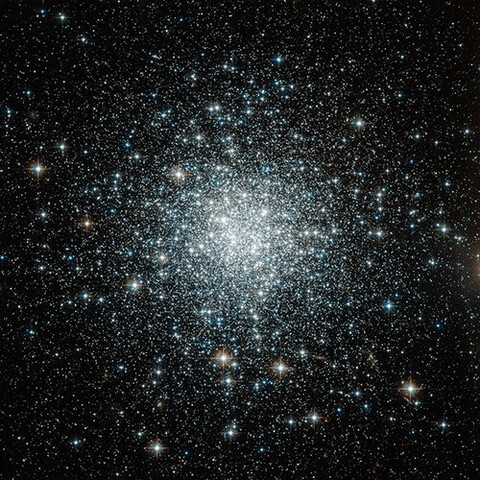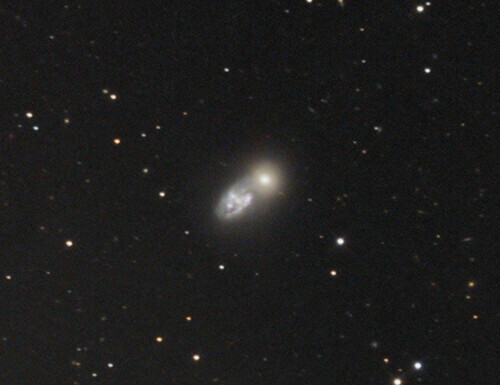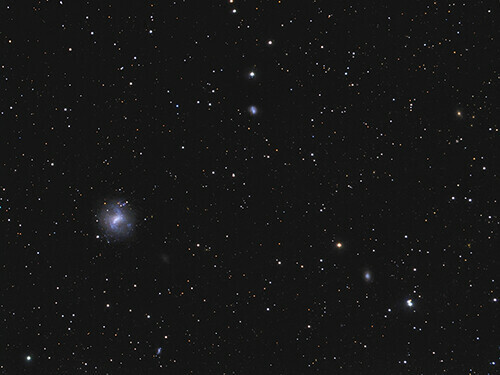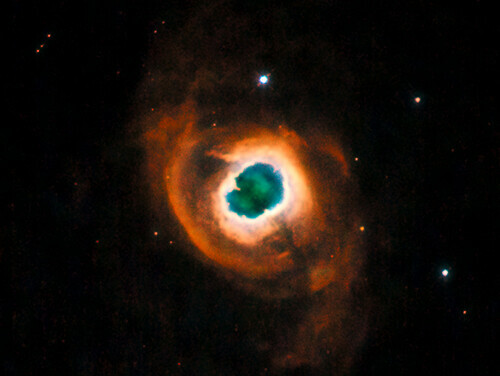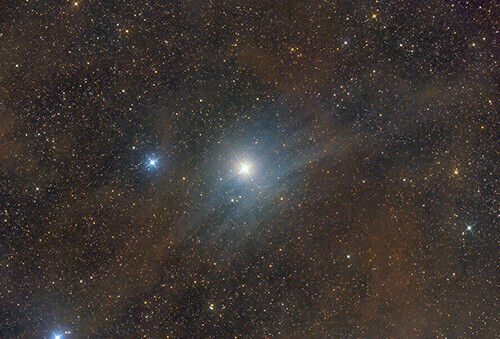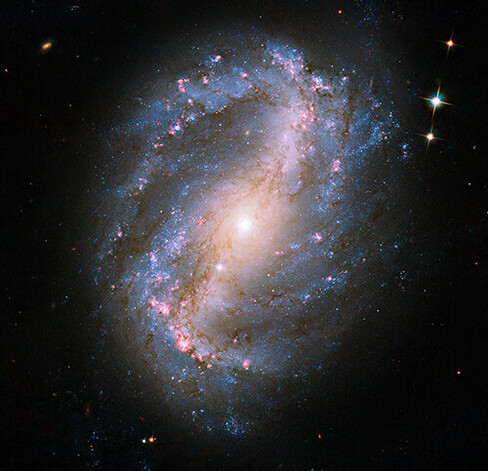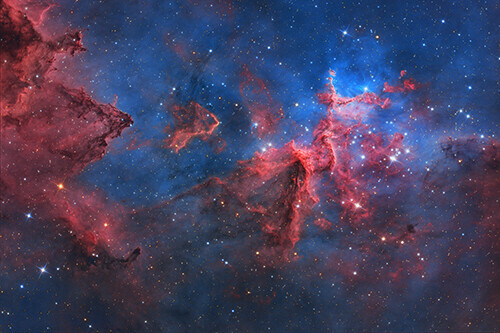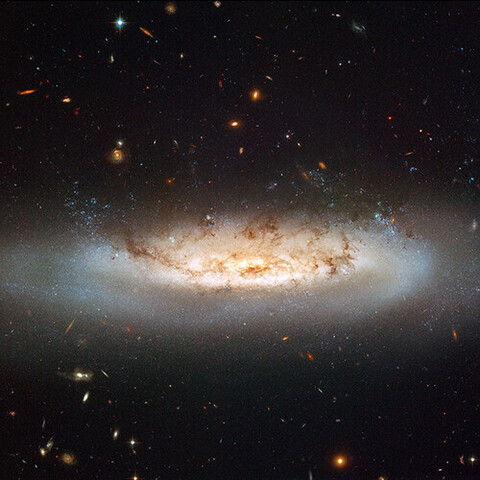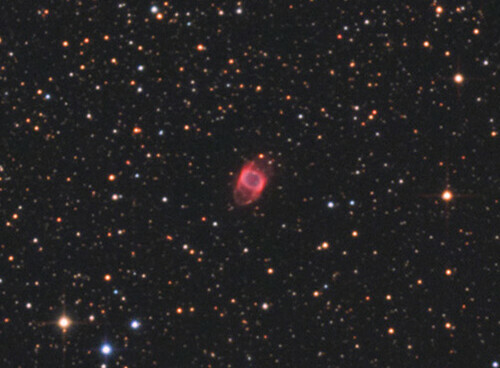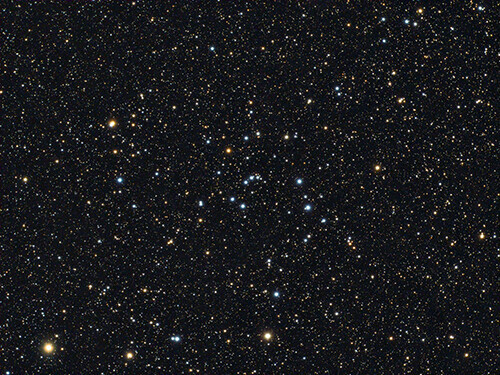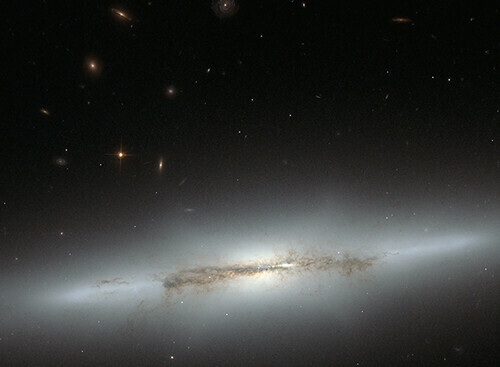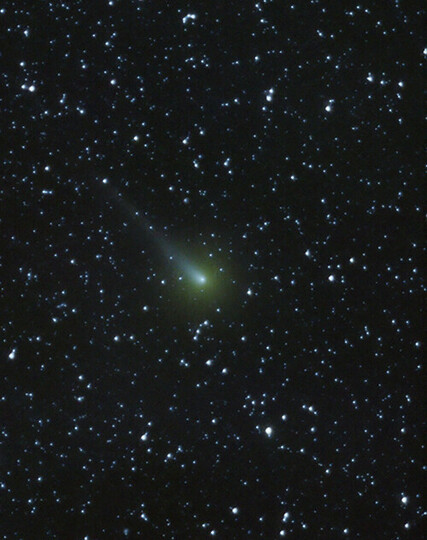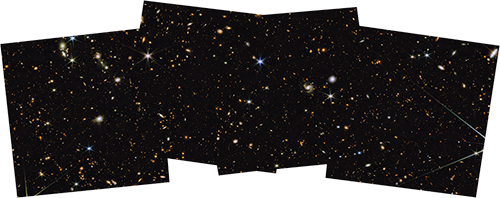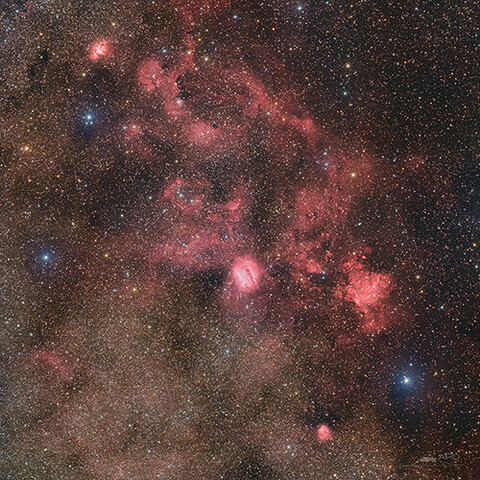Universo Mágico · @umplus
1246 followers · 869 posts · Server mastodon.online#UMPlus - Bernes 149 by JJ Pérez Guy
https://www.universomagico.net/2023/01/bernes-149-por-jj-perez-guy.html
Bernes 149 is a very dense dark cloud located in the direction of the border between the constellations of Scorpius and Lupus that is at a distance of about 550 light years from the Solar System. Infrared observations have shown a large number of protostars inside the dark cloud. protostars are stars so young that they are still wrapped in the cocoon of material from.....
#astronomy #space #astrophysics #astrophotography
#astrophotography #astrophysics #space #astronomy #UMPlus
Universo Mágico · @umplus
1241 followers · 862 posts · Server mastodon.online#UMPlus - Caldwell 47 globular cluster
https://www.universomagico.net/2023/01/cumulo-globular-caldwell-47.html
This image taken by the Hubble Space Telescope shows Caldwell 47, a shimmering globular cluster, in all its glory. Star clusters like this circle our galaxy like bees buzzing around a hive. Open clusters lightly crowded in the center are often found scattered throughout the galactic disk, a relatively flat area that includes most of the galaxy's contents, including the.....
#astronomy #space #astrophysics #astrophotography
#astrophotography #astrophysics #space #astronomy #UMPlus
Universo Mágico · @umplus
1241 followers · 861 posts · Server mastodon.onlineMastodon - Minds https://www.minds.com/groups/profile/1144295236524617728/feed
#UMPlus - Hickson 90
https://www.universomagico.net/2023/01/hickson-90.html
The image taken by the Hubble Space Telescope shows three of the four main galaxies that make up the Hickson 90 compact group, visible in the image are NGC 7173, NGC 7174 and NGC 7176, the fourth galaxy called NGC 7172 or HCG 90a, is located more north of these three it is not visible in the field of view, although the group may contain more.....
#astronomy #space #astrophysics #astrophotography
#astrophotography #astrophysics #space #astronomy #UMPlus
Universo Mágico · @umplus
1239 followers · 860 posts · Server mastodon.online#UMPlus - Arp 140 by Dan Crowson
https://www.universomagico.net/2022/12/arp-140-por-dan-crowson.html
Excellent astronomer Dan Crowson's image shows Arp 140, a galaxy interaction consisting of NGC 274 and NGC 275, mouse over the image or click on the touch screens to identify both galaxies. These galaxies are in the direction of the Cetus Constellation and are located at a distance of about 69 million light years from the Milky Way. NGC 274 is a.....
#astronomy #space #astrophysics #astrophotography
#astrophotography #astrophysics #space #astronomy #UMPlus
Universo Mágico · @umplus
1238 followers · 859 posts · Server mastodon.online#UMPlus - Galaxies in Canes venatici by Jim Thommes
https://www.universomagico.net/2022/12/galaxias-en-canes-venatici-por-jim.html
The image of astronomer Jim Thommes contains a large number of cataloged objects, it is one of the best studied regions of the sky. The image focuses on the Canes Venatici Constellation whose most representative objects are three galaxies, however it hides many secrets that we will reveal in this article. NGC 4228, also cataloged as NGC 4214, is a.....
#astronomy #space #astrophysics #astrophotography
#astrophotography #astrophysics #space #astronomy #UMPlus
Universo Mágico · @umplus
1234 followers · 857 posts · Server mastodon.online#UMPlus - PK 084+01 1
https://www.universomagico.net/2022/12/pk-08401-1.html
Pk 084+01 1 is a planetary nebula located at a distance of about 4,500 light years from Earth and located in the direction of the Cygnus Constellation. It consists of a bright inner ring surrounded by a dimmer asymmetric layer. The entire system is surrounded by a faint red halo of light emitted by ionized nitrogen. This multi-layered structure is quite uncommon in.....
#astronomy #space #astrophysics #astrophotography
#astrophotography #astrophysics #space #astronomy #UMPlus
Universo Mágico · @umplus
1231 followers · 856 posts · Server mastodon.online#UMPlus - VdB 109 by Emil Ivanov
https://www.universomagico.net/2022/12/vdb-109-por-emil-ivanov.html
VdB 109, seen here in an excellent image by astronomer Emil Ivanov, is a reflection nebula located to the south of the constellation Ophiuchus. It is a faint nebulous veil that runs along the star 24 Sco, a giant of magnitude 5 of spectral class G7.5II-IIICN1Ba0.5 B. Parallax measurements of the star indicate that it is at a distance of 388 light years from the.....
#astronomy #space #astrophysics #astrophotography
#astrophotography #astrophysics #space #astronomy #UMPlus
Universo Mágico · @umplus
1228 followers · 855 posts · Server mastodon.online#UMPlus - NGC 6217
https://www.universomagico.net/2022/12/ngc-6217.html
NGC 6217, also cataloged as Arp 185, is a barred spiral galaxy located at a distance of about 90 million light-years from the Milky Way in the direction of the Ursa Major constellation. It has a structure similar to a false outer ring formed from the spiral arms, a well-defined bar running through the nucleus, and a partial inner ring and moderately coiled spiral arms. The nucleus is.....
#astronomy #space #astrophysics #astrophotography
#astrophotography #astrophysics #space #astronomy #UMPlus
Universo Mágico · @umplus
1221 followers · 854 posts · Server mastodon.online#UMPlus - IC 1805 by Tony Hallas
https://www.universomagico.net/2022/12/ic-1805-por-tony-hallas.html
The detailed image taken by astronomer Tony Hallas of the interior of Sh2-190, popularly known as the Heart Nebula, shows the columns of gas and dust emerging from the center of the nebula. The stars of the open star cluster that nestles in the center of the heart, cataloged as IC 1805, Melotte 15 and Collinder 26 among other designations, compress and heat gas and dust to....
#astronomy #space #astrophysics #astrophotography
#astrophotography #astrophysics #space #astronomy #UMPlus
Universo Mágico · @umplus
1221 followers · 854 posts · Server mastodon.onlineMastodon - Minds https://www.minds.com/groups/profile/1144295236524617728/feed
#UMPlus - NGC 4522
https://www.universomagico.net/2022/12/ngc-4522.html
Astronomers are studying an interesting and important phenomenon called ram detachment, so powerful that it is capable of tearing apart galaxies and even stopping their star formation. NGC 4522 is a spectacular example of a spiral galaxy currently being stripped of its gas content. The galaxy is part of the Virgo Cluster of Galaxies and its.....
#astronomy #space #astrophysics #astrophotography
#astrophotography #astrophysics #space #astronomy #UMPlus
Universo Mágico · @umplus
1221 followers · 854 posts · Server mastodon.online#UMPlus - Menzel 1 By Sergio Eguivar
https://www.universomagico.net/2022/12/menzel-1-por-sergio-eguivar.html
Menzel 1, seen here at the center of an excellent image taken by Argentine astronomer Sergio Eguivar, is a bright ellipsoidal planetary nebula that has a prominent central ring of higher emission. It is located in the direction of the Constellation Norma and is located at a distance of about 3,400 light years from the Solar System. One of the models of its structure is a.....
#astronomy #space #astrophysics #astrophotography
#astrophotography #astrophysics #space #astronomy #UMPlus
Universo Mágico · @umplus
1217 followers · 851 posts · Server mastodon.online#UMPlus - Stock 12 by Bernhard Hubl
https://www.universomagico.net/2022/12/stock-12-por-bernhard-hubl.html
Stock 12, seen here in an excellent image by astronomer Bernhard Hubl, is an open star cluster located in the direction of the constellation Cassiopeia and lies at a distance of about 1,300 light-years from the Solar System. It measures about 25 arc minutes across the sky, although no magnitudes are available for the group of stars that make up the group, HD 221781, what appears to.....
#astronomy #space #astrophysics #astrophotography
#astrophotography #astrophysics #space #astronomy #UMPlus
Universo Mágico · @umplus
1221 followers · 854 posts · Server mastodon.online#UMPlus - Stock 12 by Bernhard Hubl
https://www.universomagico.net/2022/12/stock-12-por-bernhard-hubl.html
Stock 12, seen here in an excellent image by astronomer Bernhard Hubl, is an open star cluster located in the direction of the constellation Cassiopeia and lies at a distance of about 1,300 light-years from the Solar System. It measures about 25 arc minutes across the sky, although no magnitudes are available for the group of stars that make up the group, HD 221781, what appears to.....
#astronomy #space #astrophysics #astrophotography
#astrophotography #astrophysics #space #astronomy #UMPlus
Universo Mágico · @umplus
1214 followers · 850 posts · Server mastodon.online#UMPlus - NGC 4710
https://www.universomagico.net/2022/12/ngc-4710.html
Still an astrophysical mystery, the evolution of bulges in spiral galaxies led astronomers to observe the galaxy NGC 4710, even though it is an edge-on galaxy. By looking directly at the center of the galaxy, a faint, ethereal X-shaped structure can be detected. A feature that astronomers call a square or.....
#astronomy #space #astrophysics #astrophotography
#astrophotography #astrophysics #space #astronomy #UMPlus
Universo Mágico · @umplus
1221 followers · 854 posts · Server mastodon.online#UMPlus - NGC 4710
https://www.universomagico.net/2022/12/ngc-4710.html
Still an astrophysical mystery, the evolution of bulges in spiral galaxies led astronomers to observe the galaxy NGC 4710, even though it is an edge-on galaxy. By looking directly at the center of the galaxy, a faint, ethereal X-shaped structure can be detected. A feature that astronomers call a square or.....
#astronomy #space #astrophysics #astrophotography
#astrophotography #astrophysics #space #astronomy #UMPlus
Universo Mágico · @umplus
1212 followers · 849 posts · Server mastodon.online#UMPlus - Comet C/2014 S2 (PanSTARRS)
https://www.universomagico.net/2022/12/cometa-c2014-s2-panstarrs.html
Comet C/2014 S2 (PanSTARRS), seen here in an October 2015 image by astronomer Fritz Helmut Hemmerich, was discovered by the University of Hawaii's Institute for Astronomy using the 1.8-meter Pan-STARRS1 telescope. located in Haleakala on September 22, 2014, when it was shining at magnitude 20.9. However, in mid-2016 it reached its maximum brightness with a magnitude of 6.5. It is.....
#astronomy #space #astrophysics #astrophotography
#astrophotography #astrophysics #space #astronomy #UMPlus
Universo Mágico · @umplus
1221 followers · 854 posts · Server mastodon.online#UMPlus - Comet C/2014 S2 (PanSTARRS)
https://www.universomagico.net/2022/12/cometa-c2014-s2-panstarrs.html
Comet C/2014 S2 (PanSTARRS), seen here in an October 2015 image by astronomer Fritz Helmut Hemmerich, was discovered by the University of Hawaii's Institute for Astronomy using the 1.8-meter Pan-STARRS1 telescope. located in Haleakala on September 22, 2014, when it was shining at magnitude 20.9. However, in mid-2016 it reached its maximum brightness with a magnitude of 6.5. It is.....
#astronomy #space #astrophysics #astrophotography
#astrophotography #astrophysics #space #astronomy #UMPlus
Universo Mágico · @umplus
1204 followers · 848 posts · Server mastodon.online#UMPlus - 13.5 billion light years away
https://www.universomagico.net/2022/12/a-13500-millones-de-anos-luz.html
This is one of the first wide-field images of medium depth and has been captured by the James Webb Space Telescope. The field of view shows a region of the sky in the Constellation of Draco known as the North Elliptical Pole. Medium depth refers to the faintest objects that can be seen in this image, which are about 29 billion times fainter in magnitude than can be.....
#astronomy #space #astrophysics #astrophotography
#astrophotography #astrophysics #space #astronomy #UMPlus
Universo Mágico · @umplus
1221 followers · 854 posts · Server mastodon.online#UMPlus - 13.5 billion light years away
https://www.universomagico.net/2022/12/a-13500-millones-de-anos-luz.html
This is one of the first wide-field images of medium depth and has been captured by the James Webb Space Telescope. The field of view shows a region of the sky in the Constellation of Draco known as the North Elliptical Pole. Medium depth refers to the faintest objects that can be seen in this image, which are about 29 billion times fainter in magnitude than can be.....
#astronomy #space #astrophysics #astrophotography
#astrophotography #astrophysics #space #astronomy #UMPlus
Universo Mágico · @umplus
1198 followers · 847 posts · Server mastodon.online#UMPlus - RCW 96 from APO
https://www.universomagico.net/2022/12/rcw-96-desde-apo.html
The excellent image of the astronomers from the Atacama Photographic Observatory APO, offers us a cosmic landscape with a large star field dotted with dark clouds and highly ionized regions classified as HII regions and cataloged as RCW 96, RCW 97, RCW 98 and RCW 99. Some of the stars in the field of view are candidates to belong to a class of.....
#astronomy #space #astrophysics #astrophotography
#astrophotography #astrophysics #space #astronomy #UMPlus
